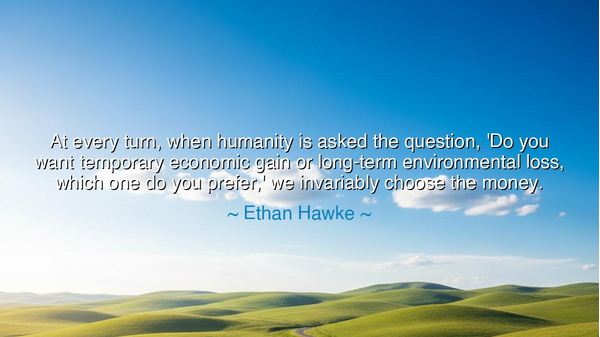
At every turn, when humanity is asked the question, 'Do you want
At every turn, when humanity is asked the question, 'Do you want temporary economic gain or long-term environmental loss, which one do you prefer,' we invariably choose the money.






Ethan Hawke, though known foremost as an artist of stage and screen, once spoke with the weight of an ancient prophet when he declared: “At every turn, when humanity is asked the question, ‘Do you want temporary economic gain or long-term environmental loss, which one do you prefer,’ we invariably choose the money.” These words strike not as mere observation but as lament, as if uttered by one who has walked the corridors of history and seen the same folly repeated by every generation. It is a cry of grief at the blindness of mankind, who sacrifices eternity upon the altar of immediacy.
The meaning of his words lies in the tragic tendency of humankind to favor the glitter of short-lived reward over the quiet endurance of stewardship. Again and again, civilizations have been confronted with the choice: protect the land, the water, the air—or exploit them for profit, comfort, and power. And again and again, the choice has been made for economic gain, though fleeting, at the cost of environmental loss that endures through centuries. Hawke’s words are thus both indictment and warning: that the pursuit of wealth without wisdom is nothing less than self-destruction dressed in gold.
The origin of this quote emerges from the modern age, when humanity’s capacity for production and consumption has reached unprecedented scale. From fossil fuels to deforestation, from oceans choked with plastic to skies veiled with smoke, the tale is the same. Decisions made for the sake of profit now echo as wounds upon the earth. Hawke, though not a scientist or politician, raises his voice as a witness of conscience, speaking in the role of the ancient seer: that art and truth together must call society to account.
History bears testimony to his warning. Consider the collapse of Easter Island, where the Rapa Nui people felled their forests to move great statues, symbols of status and pride. In pursuit of immediate gain—prestige, power, and dominance—they stripped their land bare. In the end, no trees remained, the soil eroded, and the civilization crumbled into famine and ruin. The statues still stand as monuments, but their very presence tells the story of a people who chose money, or its equivalent in prestige, over the balance of the environment. Hawke’s words echo this ancient tragedy, warning that humanity repeats Easter Island’s folly on a global scale.
There is a deeply emotional power in this declaration. It is not spoken with calm detachment, but with anguish at the predictable weakness of human nature. For the heart of man is drawn to what is immediate, to what can be counted and held, even while turning away from what is enduring but invisible. Hawke names this tendency plainly, as if to shake the sleeper awake: we “invariably choose the money.” His lament is not meant to crush hope but to confront, to pierce through the illusions we build around ourselves and force us to reckon with uncomfortable truth.
To future generations, the message is both warning and call to courage. The warning: that the path of unbridled greed leads to ruin, and that unless humanity learns to honor the long-term survival of the earth, the story of our age will end in ashes. The call: that there is still time to choose differently, still time to place environmental preservation above temporary gain. For unlike the civilizations that perished before us, we now know the cost of our actions. Knowledge, if wedded to will, can yet be salvation.
The lesson is clear: in your life, in your choices, do not fall to the temptation of the immediate if it poisons the future. Practically, this means consuming less, wasting less, demanding leaders who place sustainability above profit, and remembering always that what is taken from the earth must be given back. It means raising voices when silence would be easier, and planting seeds where others would only harvest. For in such acts, small though they seem, lies the hope of reversing the curse that Hawke describes.
Thus his words endure as a flame: “At every turn, when humanity is asked the question… we invariably choose the money.” Let them not remain prophecy, but let them become the turning point of history. Let this generation rise as the one that breaks the chain of folly, choosing not fleeting wealth but lasting life. For in this choice lies the salvation of the earth, and the preservation of all generations yet to come.






AAdministratorAdministrator
Welcome, honored guests. Please leave a comment, we will respond soon